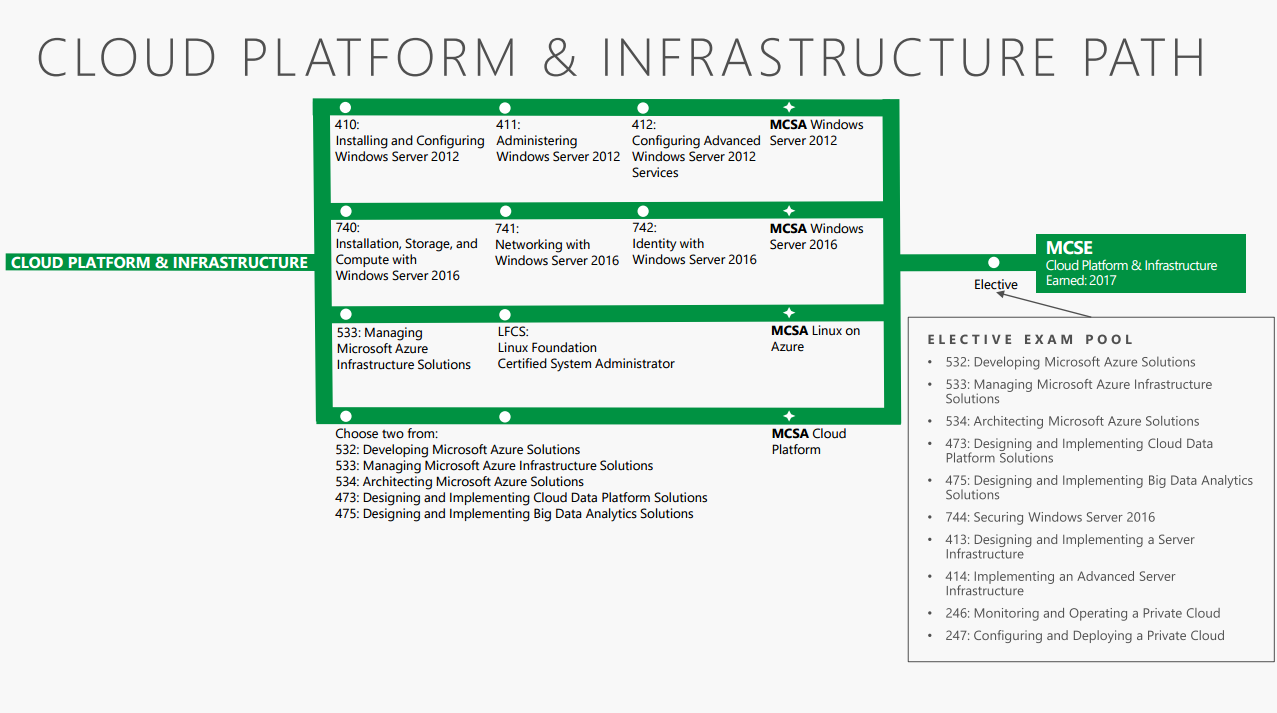Complete Windows Server Certification Guide: MTA, MCSA and MCSE

 By Alex Bennett, Firebrand Training
By Alex Bennett, Firebrand Training
Whether you’re new to Windows Server technology or an established expert, you’ll benefit from achieving a certification within Microsoft’s Cloud Platform and Infrastructure path.
For beginners, Windows Server certifications provide a clear progression track from newbie to qualified expert. For those already familiar with the technology, these credentials will fill gaps in knowledge and build the crucial skills needed when migrating to newer versions of Windows Server – like Windows Server 2016.
As well as building and proving skills, certifications equal higher earnings for professionals. Entry-level employees with a Microsoft Certified Solutions Associate (MCSA) certification earn £12,500 more than uncertified peers.
And massive certification changes at the end of 2016 mean there are now fewer exams required to achieve the coveted MCSE: Cloud Platform and Infrastructure – the peak of Microsoft’s Windows Server certification track.
Introduction to Windows Server certifications
Microsoft’s certifications follow a logical pathway; each level of certification leads students to higher, more specialised and complex qualifications.
Windows Server certifications are no different. At entry level, professionals can choose to build their server knowledge with the MTA: IT Infrastructure. It’s worth noting that MTAs do not form prerequisites for higher level Microsoft certifications.
After achieving the MTA (or with equivalent knowledge) professionals can then attempt one of three associate-level MCSA certifications, achieved by passing three exams.
Finally, one additional elective exam must be passed to achieve the MCSE (Microsoft Certified Solutions Expert). Those following the Windows Server track will achieve the MCSE: Cloud Platform and Infrastructure certification.

Recertification is dead
Recertification is dead, and the requirement to pass a recertification exam every two-to-three years was scrapped by Microsoft in 2016.
MCSA, MCSD and MCSE certifications will now remain indefinitely on your personal transcripts once achieved. The transcript will display the date each certification was achieved – highlighting how recently you updated your skills.
Instead of recertification, Microsoft is providing professionals with the option to re-earn a given certification by passing new optional electives introduced yearly. More information on recertification can be found here.
Entry level – MTA: IT Infrastructure
If you’re a complete beginner and aiming for a career in desktop and server infrastructure or private cloud computing, Microsoft’s MTA: IT Infrastructure is your best option. With no prerequisites, the entry-level MTA is ideal preparation for the MCSA: Windows Server.
This MTA certification can be achieved by passing one of five certification exams. Entry-level professionals eager to get to grips with Windows Server should consider studying for and passing Exam 98-365 - Windows Server Administration Fundamentals.
Successful students will achieve the MTA: IT Infrastructure and be prepared to commence studying for the associate-level MCSA: Windows Server certification.
Associate level – MCSA: Windows Server
Earning an MCSA is widely regarded as the foundation for a long-term career in IT. As there’s now no recertification requirement an MCSA is for life.
Microsoft supports Windows Server MCSA certifications across Windows Server 2012 and Windows Server 2016. There’s also an MCSA: Windows Server 2008, but most professionals will aim to achieve certifications aligning to more modern versions of Windows Server.
For each credential, Microsoft recommends students possess a good understanding of network fundamentals and knowledge of server hardware before beginning their studies.
Achieve either the MCSA: Window Server 2012 or MCSA: Window Server 2016 and you’ll be qualified to attempt the MCSE: Cloud Platform and Infrastructure.
Which MCSA should you choose?
If your company works with the 2016 edition, achieving the MCSA: Windows Server 2016 is a clear choice - you’ll prove your mastery of the most modern version of Windows Server and be able to take advantage of the staggering number of new features.
There’s also a significant cross over in content between both the MCSA 2012 and 2016 certifications, so the majority of the skills you learn will be relevant to both versions.
Professionals that want to gain comprehensive knowledge in Windows Server 2012 and 2016 can consider achieving the MCSA: Windows Server 2012 and then undertaking the Upgrading Your Skills to MCSA: Windows Server 2016 (exam 70-473).
With this method, you’ll build knowledge of Windows Server 2012, which is still popular across businesses, and you’ll also be prepared to assist companies in migration to 2016. However, with one additional exam to pass this route will certainly require a greater investment of time.
MCSA: Windows Server 2008 is arguably the least desirable of the certifications – consider achieving it if your organisation relies heavily on the 2008 version. Otherwise, decide between 2012 or 2016 versions.
Achieve either the 2012 or 2016 MCSA and you’ll be qualified to attempt the MCSE: Cloud Platform and Infrastructure – more on that later.
MCSA: Windows Server 2016
Released in late 2016, Windows Server 2016 is Microsoft’s newest server operating system and is set to be a big hit with businesses, professionals and users.
Developed alongside Windows 10, Windows Server 2016 is built to be a seamless experience, bridging technologies like Active Directory and virtualisation with modern concepts like containers and cloud.
To build and validate knowledge of Windows Server 2016, professionals should achieve the MCSA: Windows Server 2016. Pass three exams to achieve the certification:
- Exam 70-740: Installation, Storage, and Computer with Windows Server 2016
- Exam 70-741: Networking with Windows Server 2016
- Exam 70-742: Identity with Windows Server 2016
Take a look at this blog for an in-depth look at how to pass the MCSA 70-740 exam.
Earning an MCSA: Windows Server 2016 certification qualifies you for a position as a network or computer systems administrator or as a computer network specialist.
MCSA: Windows Server 2012
Build knowledge of Windows Server 2012 with the MCSA: Windows Server 2012 certification. As with the 2016 edition, students must pass three certification exams to achieve their certification:
- Exam 70-410: Installing and Configuring Windows Server 2012
- Exam 70-411: Administering Windows Server 2012
- Exam 70-412: Configuring Advanced Windows Server 2012 Services
Take a look at this article for Windows Server 2012 revision resources you might have missed.
MCSA: Windows Server 2008
Windows Sever 2008 is still in use across organisations, but just like the now unsupported Windows Server 2003, 2008’s days are numbered.
However, if your organisation is using Windows Server 2008 and does not plan on upgrading, you may consider attaining the MCSA: Windows Server 2008. Pass the following three exams to achieve it:
- Exam 70-640: Windows Server 2008 Active Directory, Configuring
- Exam 70-642: Windows Server 2008 Network Infrastructure, Configuring
- Exam 70-646: Windows Server 2008, Server Administrator
It’s worth noting that, while this certification is still available and will provide a great introduction to Windows Server 2008, it will not act as a prerequisite towards your MCSE: Cloud Platform and Infrastructure certification.
Instead, to qualify for this MCSE, you’ll need to achieve the MCSA: Windows Server 2012 or MCSA: Windows Server 2016 credential.
Professionals with existing knowledge of Windows Server 2008 or 2012 can also update their knowledge through the Upgrading Your Skills to MCSA Windows Server 2016 exam.
Expert level – Cloud Platform and Infrastructure
After earning the MCSA: Windows Server 2012 or 2016, ambitious professionals eager to prove their skills at the highest level should aim for the MCSE: Cloud Platform and Infrastructure certification.
The MCSE: Cloud Platform and Infrastructure was released in 2016 as part of Microsoft’s certification restructure. This advanced certification recognises your ability to manage data centres and proves your knowledge of Windows Server, virtualisation, systems and identity management and storage.
Under Microsoft’s new certification structure, earning the MCSE: Cloud Platform and Infrastructure certification requires that learners pass one additional elective exam from a pool of 10 (after completing the MCSA).
These MCSE electives are an opportunity to build knowledge in the new cloud features found within Windows Server 2016. Professionals can also focus on security by passing the Securing Windows Server 2016 exam. Here’s the full list:
- Exam 70-532 - Developing Microsoft Azure Solutions
- Exam 70-533 - Implementing Microsoft Azure Infrastructure Solutions
- Exam 70-534 - Architecting Microsoft Azure Solutions
- Exam 70-473 - Designing and Implementing Cloud Data Platform Solutions
- Exam 70-475 - Designing and Implementing Big Data Analytics Solutions
- Exam 70-744 - Securing Windows Server 2016
- Exam 70-413 - Designing and Implementing a Server Infrastructure
- Exam 70-414 - Implementing an Advanced Server Infrastructure
- Exam 70-246 - Monitoring and Operating a Private Cloud
- Exam 70-247 - Configuring and Deploying a Private Cloud
This is the pinnacle of Microsoft’s Windows Server certification track and professional’s holding the MCSE: Cloud Platform and Infrastructure have demonstrated their knowledge at the highest level.
Comments
- Anonymous
June 30, 2017
I like these changes. I will move forward with my certifications now. I was concerned Microsoft might move to an annual recertification but it doesn't look that way now.- Anonymous
July 03, 2017
You're right George, they've definitely committed to this model (at least for the next few years).
- Anonymous
- Anonymous
November 02, 2017
Nice guidance - Anonymous
November 25, 2017
Hello Alex, Just for clarity, does this means that after writing 70-413 or 70-414 i will earn the MCSE and not that i have to write the two as it was before now. Thanks - Anonymous
December 11, 2018
Kindly, may I do exam # 70-411 then 70-410?